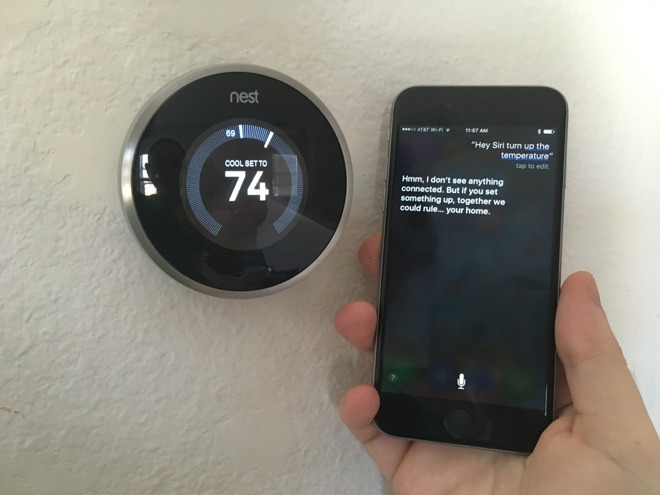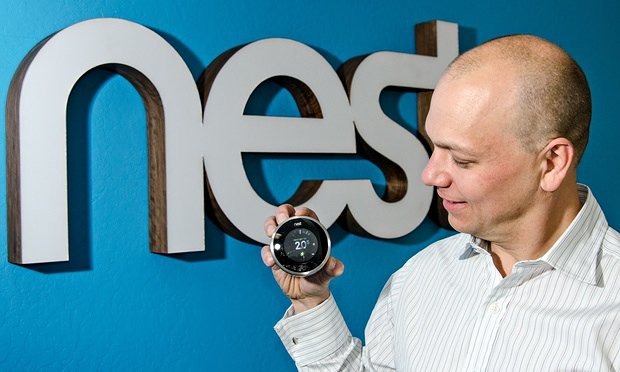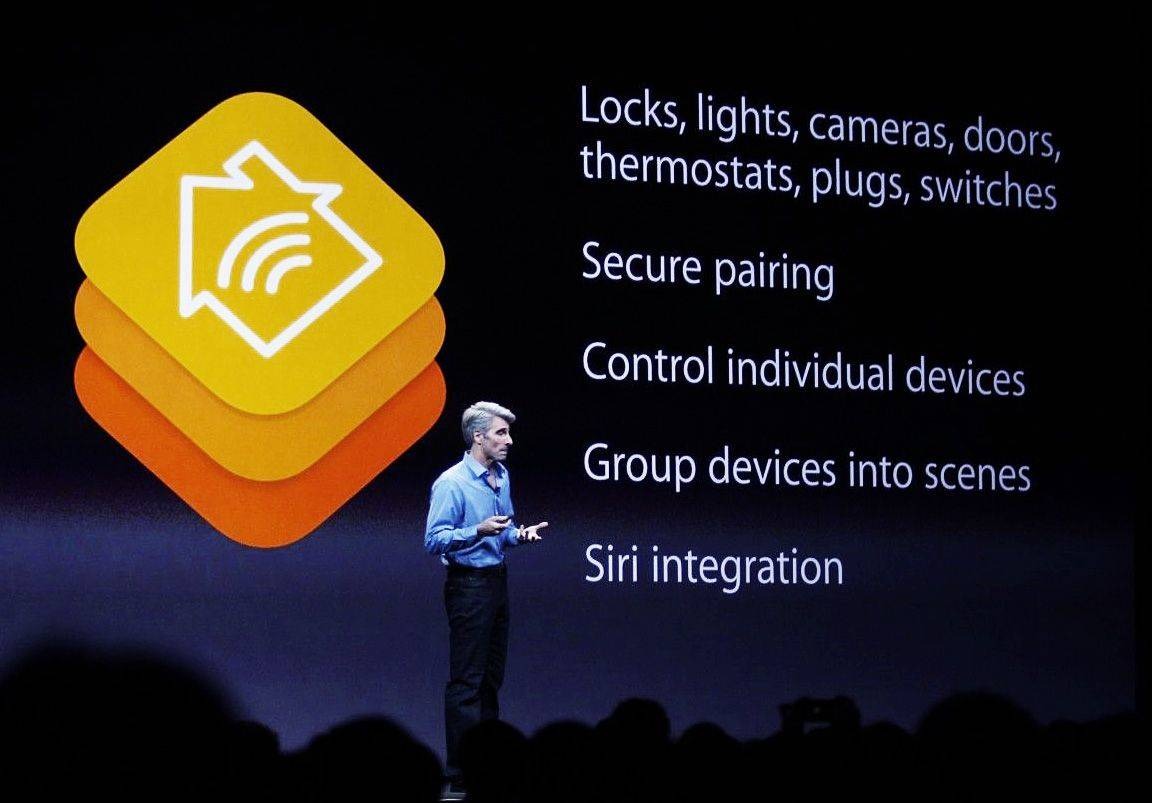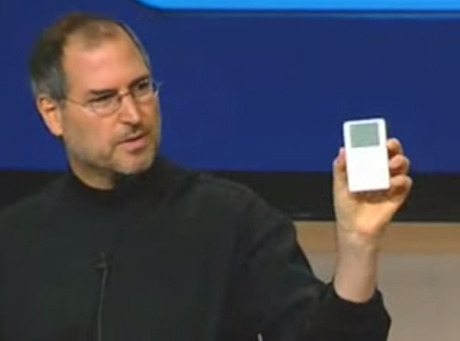The Nest smart home thermometer, designed by one of the 'fathers of the iPod' Tony Fadell, was on sale shortly after its debut at Apple retail stores. So why doesn't HomeKit support it? AppleInsider explains.
tl;dr: A combination of Apple and Google fighting for supremacy, and technical issues induced by the two companies while developing a coherent "internet of things" strategy complicates things for consumers, at least for now.
Genesis of the Nest
After a time with Philips Electronics, Tony Fadell launched Fuse in 1999 to develop the next generation of audio players. Fuse shut down operations after less than a year after failing to find sufficient funding. After a brief span of time at RealNetworks, Fadell landed at Apple as a contractor to design the iPod, and plan Apple's nascent audio product long-term strategy.
After his time with as a contractor, Fadell was hired to run the iPod and Special Projects group inside Apple in April 2001. In 2006, he was promoted to Vice President of the iPod division. Before his ultimate departure from Apple in 2008, Fadell set out to build a new home, and in the process found a market opportunity for a smart thermostat to better control climate control systems. As a result, Fadell founded Nest Labs in 2010.
Shortly thereafter, in 2011, the first generation Nest Learning Thermostat shipped. On May 30, 2012, the Nest appeared at the Apple online and retail stores started stocking it.
Evolution of the marketplace
At the 2014 Apple World Wide Developer's Conference, Apple made its plans for its own home automation system public. Dubbed HomeKit, the system allows users to connect to a variety of compatible so-called "internet of things" devices through the iOS Home app in conjunction with each other, as opposed to a series of disconnected interfaces.
When a third-generation or newer Apple TV is added to the home network, a user's HomeKit-compatible devices can be accessed from outside the home, across the internet. The addition of Siri control to HomeKit allows for complicated sequences of events to be induced from an iOS device, and soon, to a Mac running Sierra.
HomeKit is the core of a smarthome solution, with Siri the control. Individual apps from manufacturers are still required in some situations, to provide more granular control over a device, so HomeKit by itself is not a universal solution.
On January 13, 2014, Google purchased Nest Labs for $3.2 billion.
"The whole goal is not to be totally independent — not just they just funnel us money," Fadell said of the acquisition. "This is about something much bigger."
The core of Nest's employees and intellectual property was used to ultimately launch Google Home, with similar functionality to HomeKit.
The end of Apple's commitment to Nest
Following the Google purchase, the Nest was still stocked in Apple stores, but with less of a presence, and fewer items in inventory. An Apple Store employee told us while researching this article that "the July removal of [the Nest] from our shelves was the end of a long draw-down, that started just a few days after Tim [Cook] got word of Google's buy."
On July 22, 2015, Apple removed the Nest from its online store for the second time. It was replaced by the HomeKit-compatible ecobee3 thermostat.
At the time, Nest representatives said that their products would return to the Apple store, saying that "Apple is a valued partner to Nest and our new products will be available through Apple and other retail channels in the coming weeks."
Nest would never return.
Fall from grace
After the Alphabet reorganization of the monolithic Google, compounded by a series of problems since the acquisition of Nest with both the Smart Thermostat and follow-on Protect smoke detector, June of 2016 saw Fadell leaving Nest, under a hailstorm of criticism from employees inside Google. After exit, Fadell was panned for insuring that "Nest's every step is administered to death" forcing an company environment where it was "always crunch time."
With the departure of Fadell, the last friendly connection to Apple's upper corporate structure inside Alphabet's home automation initiative was severed.
Technically speaking...
The Nest family of products communicates with Alphabet's Weave. The protocol was developed by Nest, and implements traditional 802.11g/n Wi-Fi as well as some features of the 802.15.4 low-rate wireless communications protocol intended for the "internet of things."
Apple's HomeKit is a proprietary solution called "HomeKit Accessory Protocol" or HAP. One implementation of HAP uses HTTP and TCP networking and utilizes the company's Bonjour discovery, with the other using Bluetooth. All HomeKit-compatible devices must have an embedded MFi authorization chip — Â something the Nest lacks.
Applications from third-party hardware vendors often exist for both Android and iOS control of individual "internet of things" devices. These apps allow users to use the app-controlled hardware by itself, without introducing Google Home or HomeKit into the mix. Without the overall coordination that Alphabet and Apple encompassing technologies bring, complex commands coordinating multiple devices and scenarios aren't possible.
Complicating matters, while the Alphabet and Apple communication methods with devices use common hardware like Wi-Fi and Bluetooth, on a network protocol level they are completely incompatible without some form of bridging and translating software.
Ambitious developers are attempting to come to the rescue of consumers wishing to bridge the gap, but so far, the solutions — Â such as a project known as Homebridge — are complicated for the average home user to implement.
Capturing mindshare, and the market
The home automation market is small, but growing. Researchers claim that at present only around six percent of U.S. households possess internet-connected home automation compatible appliances, with an increase to 15 percent by 2012.
The first commercial MP3 player was launched in 1998, and sold approximately 50,000 units per year. Apple wasn't the first to market with the iPod, coming only in the end of 2001.
Hard drive-based MP3 players were available a year before the iPod from Creative and other vendors. Apple's success with the iPod was credited to tight integration with iTunes, ease of overall use, in conjunction with an attractive design.
At stores like Home Depot, and other large-box hardware and home improvement stores, "Nest" is synonymous for smart thermometers, the same as "Kleenex" is for facial tissue and "iPad" is for tablets. For marketshare and mindshare reasons, neither Apple nor Alphabet are interested in insuring cross-compatibility in a very emergent market at this time. Plus, the value of a product's specific name being connected to an entire market segment cannot be denied from a consumer mindset standpoint.
Consumer-level home automation, spearheaded by off-the-shelf solutions rather than custom wiring, is in its infancy. It's only just now easy to set up, with the wider market looking at getting into home automation products. The "internet of things" market stands now as the MP3 player did before the 2001 reveal of the iPod: no clear leader, and a lot of unknowns.
Speaking about predicting technological trends, late Apple co-founder Steve Jobs said in 2008 that "these waves of technology, you can see them way before they happen, and you just have to choose wisely which ones you're going to surf."
Apple or Alphabet can still take the home automation throne, and there's no clear future victor now. Every move either company makes now sends small ripples forward in time, making waves later down the road.
 Mike Wuerthele
Mike Wuerthele










-m.jpg)






 Charles Martin
Charles Martin
 Christine McKee
Christine McKee
 Wesley Hilliard
Wesley Hilliard
 Malcolm Owen
Malcolm Owen
 Andrew Orr
Andrew Orr
 William Gallagher
William Gallagher
 Sponsored Content
Sponsored Content








43 Comments
This all stinks because I vastly prefer the Nest to the EcoBee 3 (was not impressed).
I agree that this totally stinks. I have a Nest, and I do like it. But I really resent the fact that I'll never be able to use it with the rest of the Homekit ecosystem.
This is the worst example of tribalism that leads to a crappy experience all around. I also got some smart light bulbs for christmas, and they too are not homekit enabled. I don't want to be ungrateful, I appreciate receiving a gift. But it just sucks hard that my "smart" home devices are not integrated with my smartphone platform of choice: iPhone.
Good. Less reason to buy the spyware crap devices.